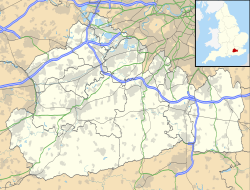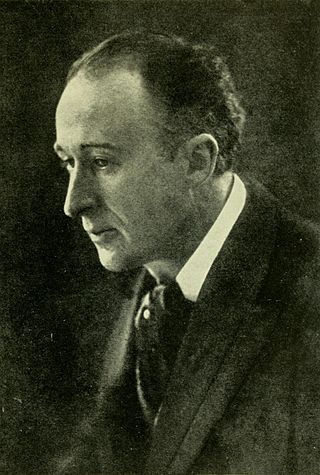
Frederick Theodore Albert Delius was an English composer. Born in Bradford in the north of England to a prosperous mercantile family, he resisted attempts to recruit him to commerce. He was sent to Florida in the United States in 1884 to manage an orange plantation. He soon neglected his managerial duties, and in 1886 returned to Europe.

Holy Sepulchre London, formerly and in some official uses Saint Sepulchre-without-Newgate, is the largest Anglican parish church in the City of London. It stands on the north side of Holborn Viaduct across a crossroads from the Old Bailey, and its parish takes in Smithfield Market. During medieval times, the site lay outside ("without") the city wall, west of the Newgate.

Limpsfield is a village and civil parish in Surrey, England, at the foot of the North Downs close to Oxted railway station and the A25. The composer Frederick Delius, orchestral conductor Sir Thomas Beecham and clarinettist Jack Brymer are buried in the village churchyard. The village contains 89 listed buildings.
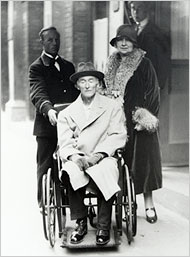
Hélène Sophie Emilie Rosen, later known as Jelka Delius, was a German painter, best known as the wife of the English composer Frederick Delius.

Beatrice Harrison was a British cellist active in the first half of the 20th century. She gave first performances of several important English works, especially those of Frederick Delius, and made the first or standard recordings of others, particularly the first recording of Elgar’s cello concerto in 1920 with the composer conducting.

St Peter's Church is the parish church of Prestbury, Cheshire, England. It is probably the fourth church on the site. The third, the Norman Chapel, stands in the churchyard. The church is recorded in the National Heritage List for England as a designated Grade I listed building. The Norman Chapel, the lychgate and west wall, the Hearse House, and the sundial in the churchyard are listed at Grade II. It is a Church of England parish church in the diocese of Chester, the archdeaconry of Macclesfield, and the deanery of Macclesfield.

St Wilfrid's Church is in Main Street, Melling, Lancashire, England. It is recorded in the National Heritage List for England as a designated Grade I listed building, and is an active Anglican church in the united benefice of East Lonsdale, the deanery of Tunstall, the archdeaconry of Lancaster and the diocese of Blackburn. Its benefice is combined with those of St Peter, Leck, St John the Baptist, Tunstall, St James the Less, Tatham, the Good Shepherd, Lowgill, and Holy Trinity, Wray.

St Martin's Church is a redundant Anglican church in the village of Waithe, Lincolnshire, England. It is recorded in the National Heritage List for England as a designated Grade I listed building, and is under the care of the Churches Conservation Trust. It stands in open countryside near the A16 road between Grimsby and Louth.

St Andrew's Church is a redundant Anglican church in the village of Redbourne, Lincolnshire, England. It is recorded in the National Heritage List for England as a designated Grade I listed building, and is under the care of the Churches Conservation Trust. The church stands in the centre of the village, which is to the east of the A15 road, and some 4 miles (6 km) south of Brigg.

Old St Peter and St Paul's Church is a former Anglican church near the village of Albury, Surrey, England in the care of The Churches Conservation Trust. It is recorded in the National Heritage List for England as a designated Grade I listed building. The church stands in Albury Park, to the northwest of Albury Hall, and between the villages of Albury and Shere.

The Parish Church of All Saints' Lawshall, is an Anglican church in the village of Lawshall, Suffolk, England. It has been designated by English Heritage as a Grade I listed building. The church is located in between Lawshall Hall and All Saints CEVCP Primary School. The church is in the process of joining the Chadbrooke benefice, whose Rector is Revd Matthew Lawson.
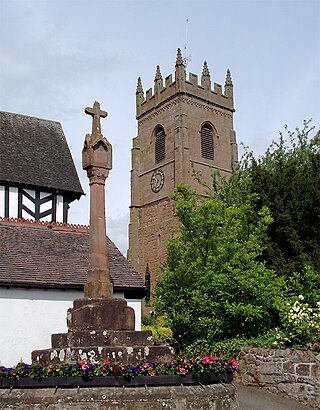
All Saints Church is in the village of Claverley, Shropshire, England. It is an active Anglican parish church in the deanery of Bridgnorth, the archdeaconry of Ludlow, and the diocese of Hereford. Its benefice is united with that of Holy Innocents, Tuck Hill. The church is recorded in the National Heritage List for England as a designated Grade I listed building.

St Peter's Church is in the grounds of Cound Hall, Cound, Shropshire, England. It is an active Anglican parish church in the deanery of Condover, the archdeaconry of Ludlow, and the diocese of Hereford. Its benefice is united with those of 13 other parishes to form the benefice of Wenlock. The church is recorded in the National Heritage List for England as a designated Grade I listed building.

St Peter's Church, Edensor, is a Grade I listed church in Edensor, Derbyshire. St Peter's is the closest parish church in the Church of England to Chatsworth House, home of the Dukes of Devonshire, most of whom are buried in the churchyard. St Peter's is in a joint parish with St Anne's Church, Beeley.
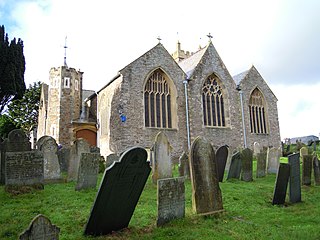
The Church of the Holy Trinity is the Anglican parish church for Ilfracombe in Devon. The building has been a Grade I listed building since 1951 and comes under the Diocese of Exeter.

May Harrison was an English violinist and the oldest of four sisters who were classical musicians in Great Britain during the early 20th century. Each had started out as a child prodigy.

Margaret Harrison (1899–1995) was an English violinist and the youngest of four sisters who were respected classical musicians in Great Britain during the early 20th century. Each had started out as child prodigies.
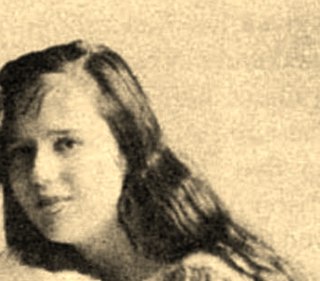
Monica Harrison (1897–1983) was an English mezzo-soprano and the third-born of four sisters who were respected classical musicians in Great Britain during the early 20th century. Each had started out as child prodigies.

St Mary the Virgin Church is a partly medieval Grade II* listed flint church on Church Road in Hayes, Hillingdon. The central portion of the church, the chancel and the nave, was built in the 13th century, the north aisle in the 15th century, and the south aisle in the 16th century, along with the lychgate and the south porch.

St Peter's Church is an Anglican church, the parish church in the village of Portesham, Dorset. It is a Grade I listed building. The earliest parts date from the 12th century, and it has suffered comparatively little from restoration.

